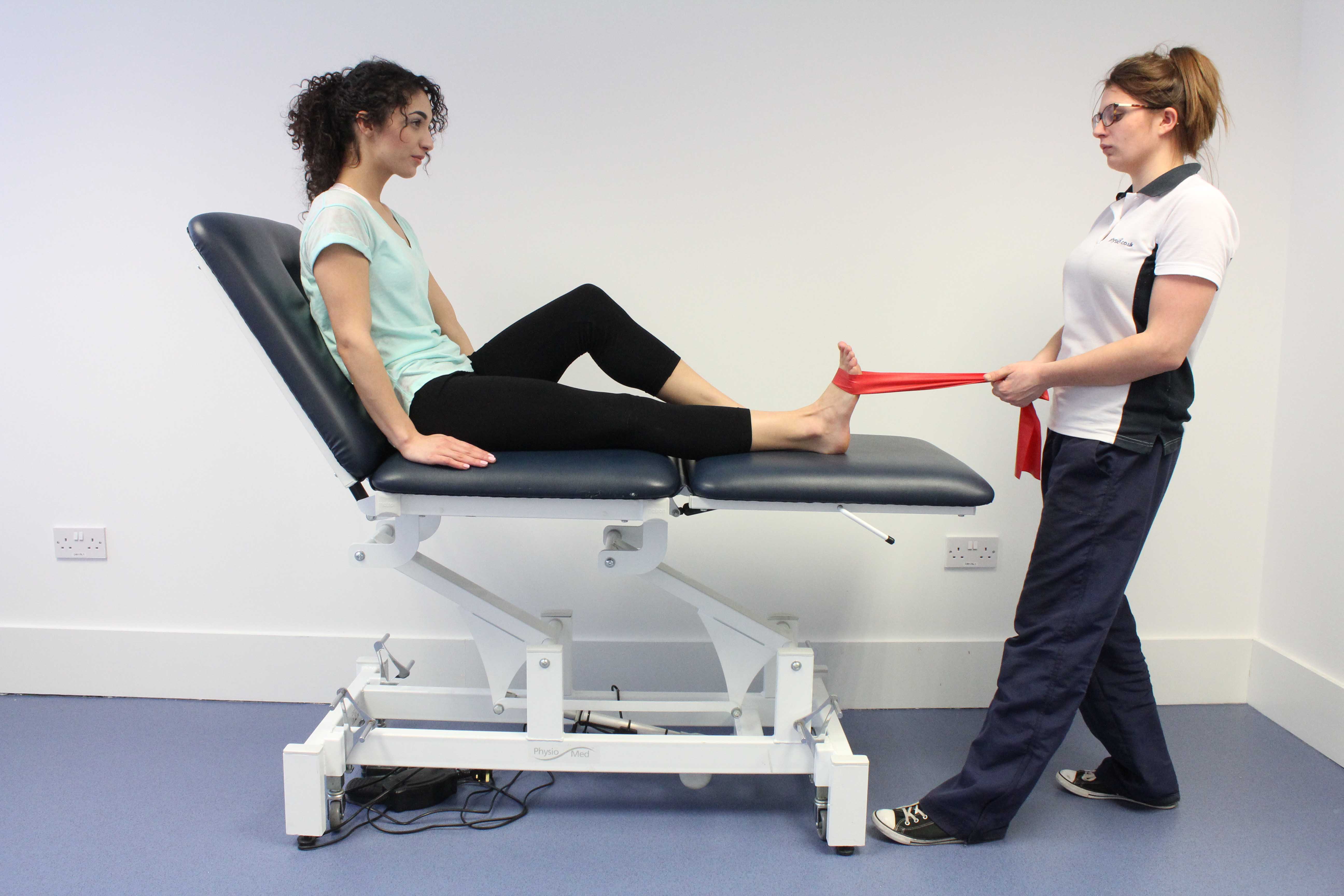What is a metatarsal stress fracture?
The metatarsals are the long bones of the forefoot. A stress fracture of a metatarsal is an incomplete fracture or crack in one of these bones. The most common metatarsal stress fracture is a fracture of the neck of the second metatarsal. This is because, in most people, this is the thinnest and longest of the metatarsal bones. Stress fractures can, however, occur in any of the five metatarsal bones of each foot. Physiotherapy is an important treatment for a metatarsal stress fracture.
How does a metatarsal stress fracture happen?
Metatarsal stress fractures occur due to a combination of factors. Unstable foot mechanics, combined with repetitive loading activity of the forefoot are two of many contributing factors. Tight footwear or high heels can also cause an increase in workload and stress on the metatarsal bones.
 Above: Soft tissue massage applied to the bones and connective tissue on the anterior portion of the foot
Above: Soft tissue massage applied to the bones and connective tissue on the anterior portion of the footStress fractures of the metatarsals are caused by an imbalance between bone formation and bone resorption (removal). When a metatarsal is loaded or stressed, such as during weight-bearing exercise, it responds by increasing its bone turnover. This is necessary for it to keep up with your demands on it.
If stress is put on a metatarsal, areas of the bone can become damaged. These damaged areas of bone are then resorbed (removed) and replaced with new bone. If the new bone formation is slower than the resorption (removal) of the old bone, weak points occur at areas of stress within the metatarsal. An area of weakness in the bone can develop into a stress fracture if the weak area of the metatarsal is repeatedly stressed.
A recent change in training can often be a factor in the development of a stress fracture. This could involve a change in frequency, duration, intensity, training surfaces or footwear.
What are the symptoms of a metatarsal stress fracture?
Metatarsal stress fractures cause pain on top of the foot. The foot is usually red and swollen and the pain is worsened with exercise. Squeezing the forefoot or pressing the top of the foot may also worsen the pain. Other symptoms can include:
What should I do if I have a metatarsal stress fracture?
If you have or suspect you have a stress fracture of any of the metatarsal bones, you should not continue to perform activity on the foot. You should arrange a physiotherapy appointment or go direct to your nearest accident and emergency department to gain a diagnosis of your injury. In the meantime you can follow the RICE regime to help reduce your pain and swelling.
 Above: Progressive strengthening exercises for the foot and ankle, assisted by specialist MSK physiotherapist
Above: Progressive strengthening exercises for the foot and ankle, assisted by specialist MSK physiotherapistWhat shouldn’t I do if I have a metatarsal stress fracture?
You should not continue to exercise if you suspect that you may have a stress fracture of a metatarsal. Tight footwear and heeled shoes should also be avoided.
Physiotherapy treatment for a metatarsal stress fracture.
Your physiotherapist can diagnose, treat and prevent future metatarsal stress fractures. Intervention may include dietary advice, footwear modifications, orthotic treatment and training advice. Imaging techniques such as CT and MRI scans are important to gain a definitive diagnosis of your injury and determine an appropriate treatment plan.
Surgery is an option in the treatment of metatarsal stress fractures that fail to heal. Following surgery, your physiotherapist will design a programme to allow you to safely return to activity and competition as soon as possible.
Other physiotherapy options include:
Could there be any long-term effects from a metatarsal stress fracture?
The management of metatarsal stress fractures must be appropriate to ensure there are no long-term risks of non-healing and necrosis (dying) of bone. Surgery may be required for non-healed fractures to ensure the bone has completely healed. If the stress fracture involves the base of the 2nd metatarsal, complications are more likely. Therefore, an early and accurate diagnosis of all stress fractures is essential.
To arrange a physiotherapy assessment call Physio.co.uk on 0330 088 7800 or book online.

 0330 088 7800
0330 088 7800





































